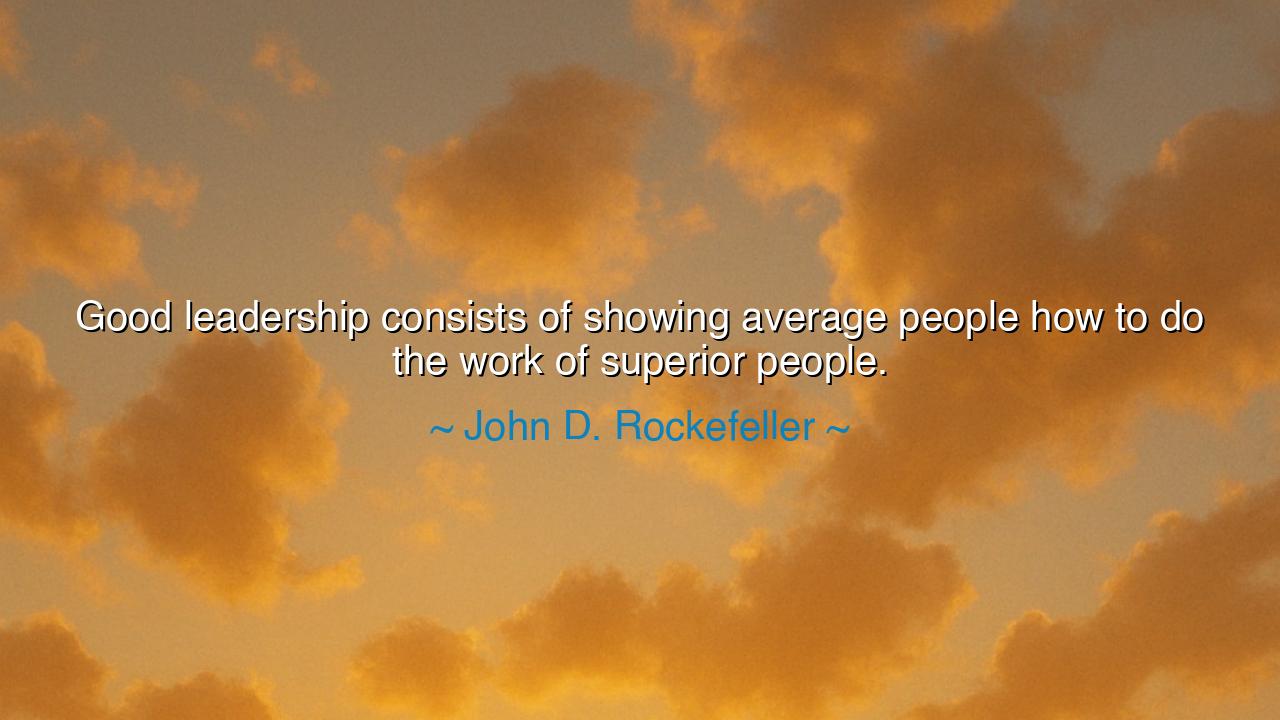
Good leadership consists of showing average people how to do the
Good leadership consists of showing average people how to do the work of superior people.






“Good leadership consists of showing average people how to do the work of superior people.” Thus declared John D. Rockefeller, the titan of industry and one of the greatest architects of enterprise in human history. In these words lies not arrogance, but deep understanding—a recognition that the true power of leadership does not rest in commanding the gifted few, but in awakening greatness within the many. The wise leader does not seek perfection in his people; he builds it. He does not wait for extraordinary men to appear; he molds ordinary ones into instruments of excellence.
To show average people how to do the work of superior people is to perform the alchemy of leadership. It is to take raw potential—untested, uncertain, perhaps even unaware of its own worth—and refine it through guidance, inspiration, and example. The good leader sees beyond skill and into spirit. He recognizes that within every person lies the spark of capability waiting to be kindled by purpose. He teaches not merely with words, but with presence—with patience, vision, and the unshakable belief that the humble can become heroic if shown the way.
John D. Rockefeller, who built an empire of oil from modest beginnings, knew that no man could rise alone. His empire—Standard Oil—was not the result of one man’s genius, but the disciplined harmony of thousands who learned to work with precision and excellence. Rockefeller’s genius was not only in strategy, but in leadership—in his ability to elevate those around him. He believed that through training, organization, and inspiration, even the average worker could perform extraordinary feats. He created systems, not just companies; he built capability where once there was chaos. And thus he proved his own maxim: great leadership transforms not only fortunes, but people.
This truth is older than industry itself. Consider King Leonidas of Sparta, who led three hundred men to stand against an army of millions at Thermopylae. Those men were not all nobles or heroes when they began; they were craftsmen, farmers, and common soldiers. Yet under his command, through discipline, courage, and unwavering example, they became more than themselves. Leonidas did not seek perfect warriors—he made them. His leadership drew from each man his highest strength, uniting them into one body of purpose. And though they fell in battle, their valor echoed through eternity, teaching the world that a leader’s greatness lies not in what he achieves alone, but in what he inspires others to achieve.
So too must we understand the power of transformation that lives within leadership. A poor leader demands performance; a great one develops it. The poor leader rules by fear or force, extracting labor without awakening loyalty. The great leader leads by faith, drawing out hidden strength through example and empowerment. He does not say, “Do as I say,” but “Come, follow as I do.” In this way, he multiplies his strength through others, turning followers into leaders, and the average into the exceptional.
Yet this task requires patience, humility, and courage. To lead people to greatness, one must first believe that greatness exists within them. The leader must resist the temptation to do all things himself, for true mastery lies not in control but in cultivation. The wise leader teaches others to think, to act, and to believe as superior men would. He shares his wisdom not to elevate himself, but to elevate all. And in that act of giving, his influence becomes immortal.
Therefore, O seeker of wisdom, learn this sacred truth: the measure of a leader is not found in the height of his own accomplishments, but in the rise of those he lifts. Do not seek to be surrounded by the already-great; seek to make the great from those around you. Teach with patience, lead with example, and believe with unwavering faith in the potential of others. For when you empower the ordinary to achieve the extraordinary, you join the ranks of those rare souls who change not only the world’s fortunes, but its future.
The lesson is clear: Good leadership is not dominance—it is development. It is the art of turning the average into the exceptional through guidance, discipline, and belief. As John D. Rockefeller taught, the greatest leaders do not simply command excellence—they create it. So be such a leader: awaken potential where others see none, build strength where others see weakness, and let your influence transform lives. For in teaching others to do the work of the superior, you yourself become one.






AAdministratorAdministrator
Welcome, honored guests. Please leave a comment, we will respond soon